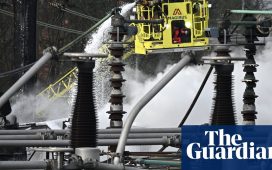Greenpeace and Friends of the Earth have accused police of acting as “private security” for the UK’s biggest carbon emitter after dozens of pre-emptive arrests forced the cancellation of a climate protest camp near Drax power station.
In a statement signed by almost 150 groups, they called the operation against activists who had spent months planning the camp near the wood-burning power station “an unreasonable restriction of free speech”.
It comes as the Labour government faces difficult choices over the future of Drax, which, despite contributing about 3% of the UK’s carbon emissions, is classed as “renewable” and benefits from about £2m a day in green energy subsidies.
Activists from Reclaim the Power had planned to camp near Drax, near Selby in North Yorkshire, from 8 August for five days, in a protest highlighting its environmental impact. But on the eve of the camp, police swooped, arresting 25 people and seizing tents, fire safety equipment and wheelchair accessible flooring, without which activists said they could not go ahead.
North Yorkshire police said they acted “swiftly and robustly to reduce the risk of unlawful activity”. But environmental groups said they are outraged at the action, which came as the country was elsewhere gripped by violent anti-immigration riots.
“Now we know what the police have been doing with their resources: preventing citizens from criticising a profit-making company which receives huge amounts of public money,” the groups said.
“The public has the right to express their views over how their money is spent. Gathering at a camp to express these views is not a crime. Police taking equipment to prevent this camp going ahead is an unreasonable restriction of free speech and is highly oppressive.
“The UK has seen 15 years of falling living standards, a cost of living crisis and decades of blaming migrants for the UK’s problems. But the real cause of our economic problems is the corrupt relationship between the state and corporations like Drax, who receive state support while profiting from sky-high energy bills, and who seem to be using the police as their own private security.”
A spokesperson for North Yorkshire police said: “It was our responsibility to manage the protest planned for the Climate Action camp in line with legal obligations. We also had a duty to ensure that people who work at Drax and members of the local community could go about their daily business as usual.”
While the protest’s impact was blunted by the police operation, Ed Miliband, the secretary of state for energy security and net zero, still faces a dilemma over Drax. Under current accounting rules, the site provides a substantial portion of the UK’s “renewable” power, a hefty chunk for which there are no obvious current replacements.
Without it, Labour’s manifesto commitment to fully decarbonise the power sector by 2030 will be hard to meet, given the slow pace of renewable energy deployment in recent years.
Built as a coal-fired power station but since converted to use wood in its boilers, Drax emitted about 11.5m tonnes of CO2 last year. Nevertheless, wood – or biomass – counts as renewable fuel, making the company eligible for renewable energy subsidies, on the basis that new forests can be grown to replace the biomass burned.
But regrowing forests takes decades, while the carbon from burning trees enters the atmosphere – and heats the planet – now. In the midst of a climate emergency, there is increasing concern from scientists and activists that biomass burning is a dangerous diversion from the task of decarbonising power.
Current subsidy arrangements expire in 2027 and it is not clear what will replace them. Drax wants public money to fit its biomass boilers with new technology to capture and store the carbon dioxide they produce. But that will take further tens of billions and, although it could cut carbon emissions, it will not solve the problem of the origins of its biomass.
Many experts believe subsidising Drax is poor value for money. Frankie Mayo, an analyst at the Ember thinktank and author of a recent report that found Drax got £550m in subsidies last year, said: “Burning wood pellets can be as bad for the environment as coal. Supporting biomass with subsidies is a costly mistake.”
Drax said it had paid £238m in total taxes so far in 2024 – half of its total pre-tax profits. It said the Ember report was “flawed” and ignored the “widely accepted and internationally recognised approach to carbon accounting”.
“Drax power station generates around 8% of the UK’s renewable electricity, keeping the lights on for millions of homes and businesses. We are paid for the power we produce like every other renewable generator,” a spokesperson for the company said.
“We plan to invest billions in developing two bioenergy with carbon capture and storage (BECCS) units at Drax power station which could create up to 10,000 new jobs at the peak of construction. The technology that underpins BECCS is proven, and it is the only credible large-scale way of generating secure renewable power and delivering carbon removals.”
A Department for Energy Security and Net Zero spokesperson said: “Investing in clean power is the route to ending the UK’s energy insecurity and tackling the climate crisis.
“The Intergovernmental Panel on Climate Change defines biomass sourced in line with strict sustainability criteria as a low carbon source of energy. We will continue to monitor biomass electricity generation to ensure it meets required standards.
“The subsidies for large-scale biomass generators will end in 2027 and we are reviewing evidence on potential support beyond this.”










